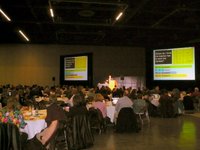 Click Photo to enlarge. Showing collection of live audience response data.
Click Photo to enlarge. Showing collection of live audience response data.
This week I’m heading to Portland Oregon on behalf of the Oregon Department of Education (ODE). Over 350 educators from around the state are gathering at the Oregon Convention Center for a day-long session that will focus on rigor, relevance, reflection and 21st century literacy. The participants include teacher / administrator teams from middle and high schools from around the state as well as higher education, pre-service teachers and others. I want to offer participants a rigorous and relevant session that engages their thinking and provides them with practical ideas. I’ve tried to design a workshop that uses technology, content and structure to model the evolving nature of collaboration and creativity in the 21st century.
During the morning session I’ll guide the group through a consideration of rigor and relevance with a focus on what it can actually look like in the classroom. I’ll model a selection of practical strategies that they can use to build student skills in defining, summarizing and comparing. Teachers always like to leave with some practical ideas.
Next I’ll turn to 21st century literacy, with a focus on how the information world our students are raised in differs from our experience. We’ll consider how digital technologies are creating new opportunities for research, innovation, and collaboration. I’ll share some exciting opportunities in digital publishing that allow student to design and write for an authentic audience.
In the afternoon I’ll be joined by educators from two Oregon high schools who will share their success in managing education plans, profiles and student portfolios. The session will close with team time devoted to processing and reflection.
I felt it was important to model what we preach so I’m using two technologies to engage audience reflection and participation. All participants will have audience response units provided by TurningTechnologies. I’ll use them in to create a large-scale Socratic seminar that will gather audience opinion and search out area of consensus and disagreement.
Since large group discussion will be rather limited, I’ve also created a workshop blog that features reflective questions tied to the major themes in the workshop. It’s been up a week and already it’s drawing some thoughtful comments and suggestions for our agenda. Both the blog and the audience response system will serve as workshop evaluation tools. We’ll also use them to gather input for ODE and next steps for future conferences. You can visit the workshop blog for a detailed look at the program and presenters. I’ve uploaded my presentation with TurningPoint audience response data. (3.5MB pdf) Here’s the presentations by Rex Putnam High School and Colton School District (363kb pdf)
Like this:
Like Loading...

